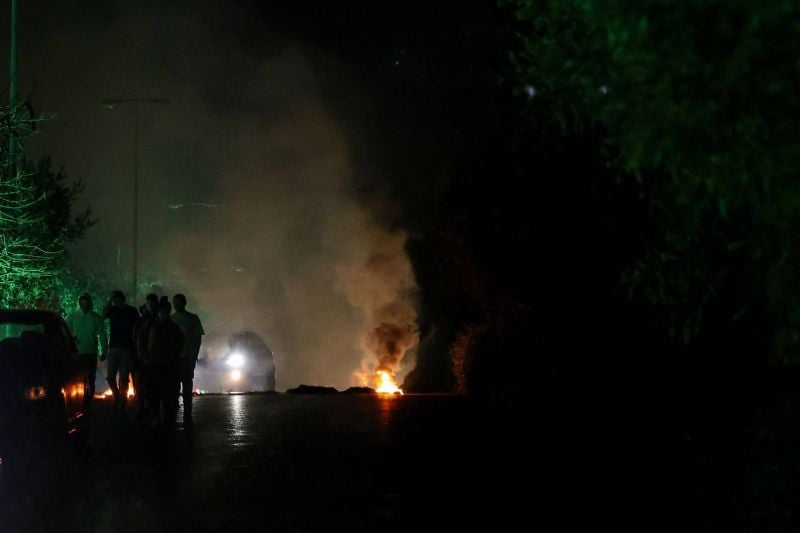
Supporters of the Lebanese forces burning tires during a gathering in Jbeil to demonstrate their anger after the murder of Pascal Sleiman, April 8, 2024. (Credit: Joseph Eid/AFP)
Before hanging up the phone, he says: "Please don't mention my name. I don't want anyone to recognize me."
A custodian in Beirut’s Geitawi neighborhood, Yasser* quickly grew worried Monday evening after news came out of the killing of Pascal Sleiman, head of the Lebanese Forces’ Jbeil district office.
The source of his fears: Many LF supporters channeling their anger toward the Syrian population in Lebanon, after Sleiman’s body was discovered across the border in Syria.
"When I saw all those videos of people attacking Syrians at random in the street appearing on social media, I realized that this could happen to any of us, even those who have nothing to be ashamed of,” Yasser says.
In one video that spread widely online, Syrians are seen being assaulted and beaten in the streets by groups of men. Watching the aggression spiral, Yasser told his wife and two daughters not to leave their apartment until he got home from work. "I'm afraid that if they go out, they'll never come back.”
‘As soon as I saw the news, I understood...’
The Lebanese Army announced on Monday that it had arrested several Syrians linked to Sleiman’s killing.
Backlash against Syrians — already increasingly targeted with beatings and other violence in recent months — was swift.
Upon hearing the news, several municipalities in the Bekaa issued bylaws prohibiting the "free movement of displaced Syrians" and ordering the "closure of their establishments.” Similar orders were issued on Tuesday in Burj Hammoud, just east of Beirut.
Interior Minister Bassam Mawlawi told a special meeting of the Central Security Council on Tuesday that "the presence of Syrians in Lebanon, as it exists today, is unacceptable.”
Last October, he claimed that 30 percent of crimes are committed by Syrian nationals, without providing any proof. These figures are contradicted by several NGOs, including Human Rights Watch, which has said that, given the number of unprosecuted crimes, these statistics should be treated with caution.
Public and state backlash against the estimated 1.5 to 2 million Syrians in Lebanon has grown in recent months. Last week, the murder of an octogenarian in his home in Sioufi, allegedly by Syrian nationals, only sparked more fervor, by locals and politicians alike.
“It's always the same. As soon as there's a political problem, they lump all Syrians together and threaten to expel us all," says Mounir, an actor in his 20s who has lived most of his life in Lebanon.
“I decided to go to the office anyway because I know that with my accent, I can pass as Lebanese without any problem. Unlike my two brothers, who preferred to stay at home today.”
Rogue checkpoints
Bassam*, who came to Lebanon as a refugee at the outbreak of the Syrian war in 2011 and now works as a delivery driver for Toters, says he was also worried about his safety on Tuesday.
"Several of my delivery friends and I thought it best to stay at home today so as not to run into an unofficial checkpoint,” he says, referring to areas where seemingly unofficial bands of people have set up illegal roadblocks for the purpose of singling out Syrians.
Samir*, who works in a restaurant in Achrafieh, also fled from these rogue checkpoints by "going west" towards Hamra to spend the night in safety. "Passing near Mar Mitr, I saw a gang of young people with iron bars stopping cars to check whether passers-by were Lebanese or Syrian," the 30-year-old explained. Samir said that these groups displayed no distinctive signs or allegiances.
Samir hopes that the situation will calm down with Eid al-Fitr on Wednesday, but others say they aren’t holding out hope.
“Last week, one of my friends, who had been living here for 10 years, was arrested at a military checkpoint in Achrafieh," Mounir says. His friend was then deported to Syria and immediately drafted into military service.
In recent years, the Lebanese authorities have stepped up the practice of one-off deportations or "voluntary repatriation" operations — despite warnings from the international community and numerous NGOs about the risks to people’s safety when returning to Syria, where enforced disappearances and mass displacement are still rife and a war still rages.
“In everyday life, I forget that I'm Syrian because I feel so integrated into this country," Mounir, the actor, says. “But as soon as something like this happens, I remember that no, I'm different."
*First names have been changed at the request of the interviewees.